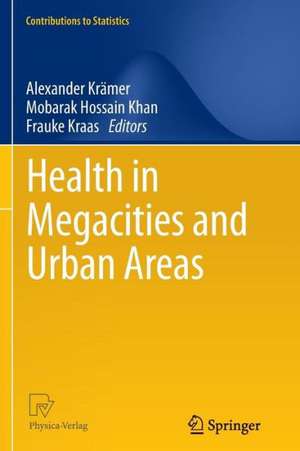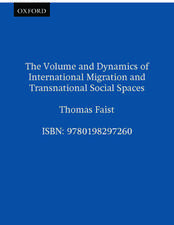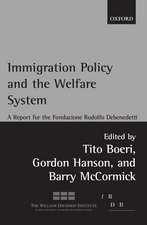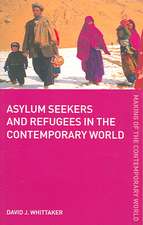Health in Megacities and Urban Areas: Contributions to Statistics
Editat de Alexander Krämer, Mobarak Hossain Khan, Frauke Kraasen Limba Engleză Paperback – 27 noi 2013
At present in many megacities and urban areas of the developing world and the emerging economies the quality of life is eroding. Most of the megacities have grown to unprecedented size, and the pace of urbanisation has far exceeded the growth of the necessary infrastructure and services. As a result, an increasing number of urban dwellers are left without access to basic amenities like clean drinking water, fresh air and safe food. Additionally, social inequalities lead to subsequent and significant intra-urban health inequalities and unbalanced disease burdens that can trigger conflict and violence between subpopulations.
The guiding idea of our book lies in a multi- and interdisciplinary approach to the complex topic of megacities and urban health that can only be adequately understood when different disciplines share their knowledge and methodological tools to work together. We hope that the book will allow readersto deepen their understanding of the complex dynamics of urban and megacity populations through the lens of public health, geographical and other research perspectives.
| Toate formatele și edițiile | Preț | Express |
|---|---|---|
| Paperback (1) | 669.70 lei 38-44 zile | |
| Physica-Verlag HD – 27 noi 2013 | 669.70 lei 38-44 zile | |
| Hardback (1) | 722.69 lei 6-8 săpt. | |
| Physica-Verlag HD – 6 iul 2011 | 722.69 lei 6-8 săpt. |
Din seria Contributions to Statistics
-
 Preț: 391.99 lei
Preț: 391.99 lei - 20%
 Preț: 332.89 lei
Preț: 332.89 lei - 15%
 Preț: 639.08 lei
Preț: 639.08 lei -
 Preț: 376.85 lei
Preț: 376.85 lei - 15%
 Preț: 664.61 lei
Preț: 664.61 lei - 15%
 Preț: 642.36 lei
Preț: 642.36 lei - 18%
 Preț: 792.19 lei
Preț: 792.19 lei -
 Preț: 389.70 lei
Preț: 389.70 lei - 18%
 Preț: 792.81 lei
Preț: 792.81 lei - 18%
 Preț: 1382.21 lei
Preț: 1382.21 lei -
 Preț: 402.38 lei
Preț: 402.38 lei -
 Preț: 403.53 lei
Preț: 403.53 lei - 18%
 Preț: 943.73 lei
Preț: 943.73 lei -
 Preț: 374.37 lei
Preț: 374.37 lei - 18%
 Preț: 955.88 lei
Preț: 955.88 lei - 15%
 Preț: 653.33 lei
Preț: 653.33 lei -
 Preț: 383.71 lei
Preț: 383.71 lei - 15%
 Preț: 645.28 lei
Preț: 645.28 lei -
 Preț: 384.86 lei
Preț: 384.86 lei - 15%
 Preț: 637.59 lei
Preț: 637.59 lei - 15%
 Preț: 641.71 lei
Preț: 641.71 lei - 15%
 Preț: 649.71 lei
Preț: 649.71 lei -
 Preț: 379.30 lei
Preț: 379.30 lei - 18%
 Preț: 942.76 lei
Preț: 942.76 lei -
 Preț: 393.35 lei
Preț: 393.35 lei - 18%
 Preț: 951.91 lei
Preț: 951.91 lei -
 Preț: 386.99 lei
Preț: 386.99 lei -
 Preț: 380.84 lei
Preț: 380.84 lei - 20%
 Preț: 651.75 lei
Preț: 651.75 lei - 15%
 Preț: 640.71 lei
Preț: 640.71 lei - 15%
 Preț: 640.37 lei
Preț: 640.37 lei - 15%
 Preț: 639.08 lei
Preț: 639.08 lei - 18%
 Preț: 944.67 lei
Preț: 944.67 lei - 15%
 Preț: 641.20 lei
Preț: 641.20 lei - 15%
 Preț: 638.57 lei
Preț: 638.57 lei - 18%
 Preț: 943.43 lei
Preț: 943.43 lei -
 Preț: 385.47 lei
Preț: 385.47 lei - 18%
 Preț: 945.47 lei
Preț: 945.47 lei -
 Preț: 388.52 lei
Preț: 388.52 lei
Preț: 669.70 lei
Preț vechi: 704.95 lei
-5% Nou
Puncte Express: 1005
Preț estimativ în valută:
128.14€ • 134.15$ • 106.03£
128.14€ • 134.15$ • 106.03£
Carte tipărită la comandă
Livrare economică 01-07 aprilie
Preluare comenzi: 021 569.72.76
Specificații
ISBN-13: 9783790828344
ISBN-10: 3790828343
Pagini: 336
Ilustrații: XIV, 319 p.
Dimensiuni: 155 x 235 x 18 mm
Greutate: 0.47 kg
Ediția:2011
Editura: Physica-Verlag HD
Colecția Physica
Seria Contributions to Statistics
Locul publicării:Heidelberg, Germany
ISBN-10: 3790828343
Pagini: 336
Ilustrații: XIV, 319 p.
Dimensiuni: 155 x 235 x 18 mm
Greutate: 0.47 kg
Ediția:2011
Editura: Physica-Verlag HD
Colecția Physica
Seria Contributions to Statistics
Locul publicării:Heidelberg, Germany
Public țintă
ResearchNotă biografică
Alexander Krämer is Professor of Public Health Medicine and a cofounder of the School of Public Health at Bielefeld University, where he has been active since 1994. During 1992-1994 he was a Visiting Assistant Professor at the Division of Epidemiology, University of Minnesota, USA. His background is in medicine, epidemiology and public health, with main research interests in infectious diseases and urban health.
Mobarak Hossain Khan is Assistant Professor at the Department of Public Health Medicine at Bielefeld University since early 2007. He obtained his M.Sc. in statistics in 1990 from Jahangirnagar University, Bangladesh, and M.Sc. in Community Health and Health Management from Heidelberg University in 2000. In 2007 he received his Ph.D. in Public Health from Sapporo Medical University, Japan.
Frauke Kraas is Professor and Chair of Human Geography at the University of Cologne since 2000. She holds a PhD (1991) and a Habilitation (1996) in Geography from the Universities of Münster and Bonn where she worked as Research Fellow and Assistant Professor from 1987 to 2000. She was awarded the Gerhard-Hess-Price (1997) and the Heisenberg Postgraduate Scholarship (1998) from the German Research Council (DFG).
Mobarak Hossain Khan is Assistant Professor at the Department of Public Health Medicine at Bielefeld University since early 2007. He obtained his M.Sc. in statistics in 1990 from Jahangirnagar University, Bangladesh, and M.Sc. in Community Health and Health Management from Heidelberg University in 2000. In 2007 he received his Ph.D. in Public Health from Sapporo Medical University, Japan.
Frauke Kraas is Professor and Chair of Human Geography at the University of Cologne since 2000. She holds a PhD (1991) and a Habilitation (1996) in Geography from the Universities of Münster and Bonn where she worked as Research Fellow and Assistant Professor from 1987 to 2000. She was awarded the Gerhard-Hess-Price (1997) and the Heisenberg Postgraduate Scholarship (1998) from the German Research Council (DFG).
Textul de pe ultima copertă
Diverse driving forces, processes and actors are responsible for different trends in the development of megacities and large urban areas. Under the dynamics of global change, megacities are themselves changing: On the one hand they are prone to increasing socio-economic vulnerability due to pronounced poverty, socio-spatial and political fragmentation, sometimes with extreme forms of segregation, disparities and conflicts. On the other hand megacities offer positive potential for global transformation, e.g. minimisation of space consumption, highly effective use of resources, efficient disaster prevention and health care options – if good strategies were developed.
At present in many megacities and urban areas of the developing world and the emerging economies the quality of life is eroding. Most of the megacities have grown to unprecedented size, and the pace of urbanisation has far exceeded the growth of the necessary infrastructure and services. As a result, an increasing number of urban dwellers are left without access to basic amenities like clean drinking water, fresh air and safe food. Additionally, social inequalities lead to subsequent and significant intra-urban health inequalities and unbalanced disease burdens that can trigger conflict and violence between subpopulations.
The guiding idea of our book lies in a multi- and interdisciplinary approach to the complex topic of megacities and urban health that can only be adequately understood when different disciplines share their knowledge and methodological tools to work together. We hope that the book will allow readers to deepen their understanding of the complex dynamics of urban and megacity populations through the lens of public health, geographical and other research perspectives.
At present in many megacities and urban areas of the developing world and the emerging economies the quality of life is eroding. Most of the megacities have grown to unprecedented size, and the pace of urbanisation has far exceeded the growth of the necessary infrastructure and services. As a result, an increasing number of urban dwellers are left without access to basic amenities like clean drinking water, fresh air and safe food. Additionally, social inequalities lead to subsequent and significant intra-urban health inequalities and unbalanced disease burdens that can trigger conflict and violence between subpopulations.
The guiding idea of our book lies in a multi- and interdisciplinary approach to the complex topic of megacities and urban health that can only be adequately understood when different disciplines share their knowledge and methodological tools to work together. We hope that the book will allow readers to deepen their understanding of the complex dynamics of urban and megacity populations through the lens of public health, geographical and other research perspectives.
Caracteristici
Gives a comprehensive and up-to-date overview of challenges in urban health, climate change and environmental health risks Written by the leading researchers from Europe and South East Asia and is a product of a longstanding and successful interdisciplinary cooperation Provides real examples of implemented project in the field of urban health in developing and developed countries Includes supplementary material: sn.pub/extras












